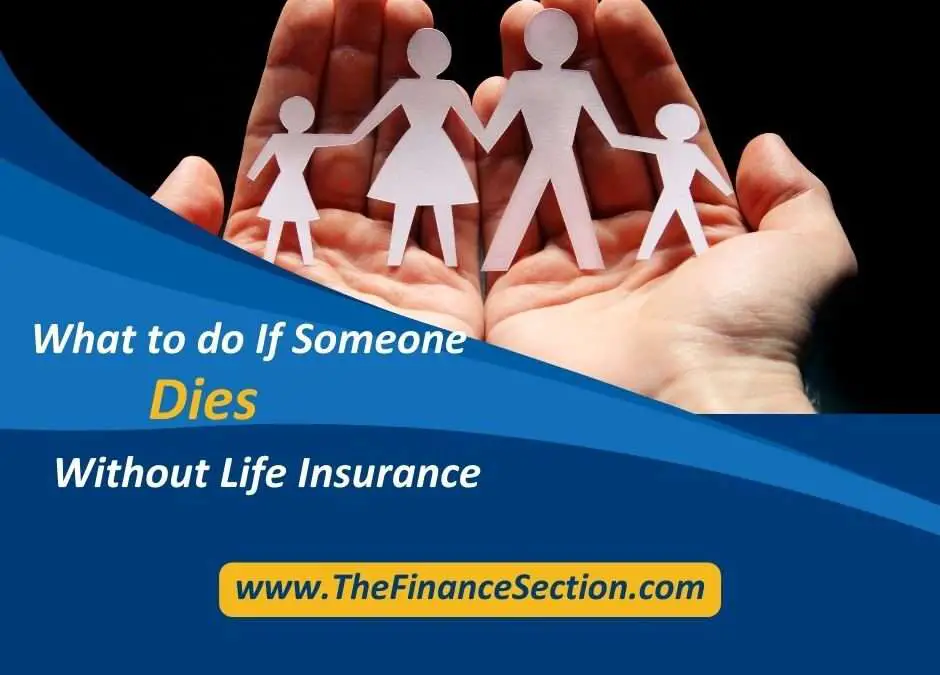Today, we’re diving into a topic that might be less pleasant to discuss but is undoubtedly important: what to do when someone passes away without life insurance. While it’s easy to bury our heads in the sand regarding financial matters, understanding the steps to take in such a situation can alleviate the burden and help you navigate challenging times. So, let’s delve into this crucial topic!

The Checklist of Doom:
When someone passes away without life insurance, it’s vital to have a checklist to guide you through the process. Let’s break it down step by step:
a) Assess the situation:
Gathering all relevant information about the deceased’s financial obligations, debts, and assets is crucial when assessing the situation. This includes collecting documents such as bank statements, loan agreements, credit card statements, and other financial records.

By understanding the overall financial picture, you can effectively manage the estate and make informed decisions regarding debt repayment, estate settlement, and distribution of assets.
b) Funeral expenses:
Funeral expenses can be a significant financial burden, especially when someone passes away without life insurance. Exploring various options to cover these costs is essential. Start by reaching out to friends and family members who may be willing to contribute or offer assistance.

Additionally, consider utilizing crowdfunding platforms to create a fundraising campaign to help alleviate the financial strain. Remember, people often come together in times of loss to provide support, so don’t hesitate to ask for help during this difficult time.
c) Estate settlement:
Estate settlement involves managing and distributing the assets of the deceased. If the person who passed away had assets, such as property, investments, or a business, it may be necessary to go through the probate process. Probate is a legal procedure that verifies the authenticity of the deceased’s will, settles outstanding debts, and ensures the proper distribution of assets according to applicable laws.

To navigate this process smoothly, it’s advisable to consult with a probate attorney who specializes in estate law. They can guide you through the legal requirements specific to your jurisdiction, assist in preparing necessary documents, and provide expertise to help ensure a fair and efficient estate settlement.
d) Debts, debts, debts:
When someone passes away without life insurance, it’s important to determine their accumulated outstanding debts. This includes credit card debt, loans, mortgages, and other financial obligations.
Next, contact the creditors to inform them about the situation and discuss potential repayment options. In some cases, creditors may be open to negotiating lower interest rates, waiving late fees, or offering extended payment plans to make the repayment more manageable.

Communicating openly and honestly with the creditors is crucial, explaining the circumstances and exploring options that fit within the estate’s financial capabilities. Seeking professional advice from a credit counselor or financial advisor can also be beneficial in navigating debt repayment and finding the best solutions.
Remember, addressing the outstanding debts responsibly is crucial for preserving the deceased’s financial reputation and protecting the estate’s assets.
e) Government assistance:
Sometimes, the government may offer assistance programs or benefits to help individuals facing financial difficulties or cover funeral expenses. According to the official guide to government information and services, Usage, found at “https://benefits-tool.usa.gov/death-of-a-loved-one/,” check if such programs exist in your jurisdiction.
Government assistance programs may vary depending on the region, but they can provide financial aid, grants, or subsidies to individuals or families in need. These programs can help alleviate the financial burden associated with funeral costs or provide support during challenging times.

To explore available options, contact local government agencies or visit their official websites to inquire about potential assistance programs and eligibility criteria. It’s important to take advantage of any available resources that can provide financial relief and support during this difficult period.
f) Emotional support:
Remember to take care of yourself and seek emotional support during this challenging time. Reach out to support groups or professionals who can help you cope with grief and loss.
A Piggy Bank in the Storm:
Life insurance acts as a safety net in times of unforeseen circumstances. Encourage your loved ones to prioritize investing in life insurance as a form of financial protection. Though it may not be the most exciting topic, having life insurance can be a financial superhero cape, providing peace of mind and support when you least expect it.
It serves as a valuable tool to safeguard your family’s financial future and ensure they are taken care of in the event of your passing.
Money-Saving Hack:
The financial impact can be overwhelming when someone passes away without life insurance. In such situations, When financial difficulties arise, getting creative with money-saving strategies can significantly impact your overall financial well-being. From cutting back on discretionary spending to embracing couponing, energy-saving habits, and exploring second-hand options, every small step towards saving counts.

By adopting these creative approaches, you can stretch your budget, reduce financial stress, and work towards achieving your financial goals, even in challenging times. Remember, every dollar saved is a step closer to financial stability and peace of mind.
Closing:
Remember, dealing with the aftermath of a loved one’s passing without life insurance can be tough. Still, you can navigate these stormy waters with a little know-how and a sprinkle of financial magic. Stay strong, and stay informed!
FAQs
What happens when someone dies, and they have no money?
In such cases, the responsibility for handling the deceased’s financial matters usually falls on the family or next of kin. Here are a few important points to consider:
1. Funeral expenses: Funeral costs can be a significant burden, but there are options available to help manage them. Reach out to local community organizations, religious institutions, or support groups that may offer assistance or guidance in covering funeral expenses.
2. Government assistance: Check if your jurisdiction provides any government assistance programs or benefits for individuals facing financial difficulties. These programs can provide support during challenging times and help alleviate the financial burden.
3. Debts and creditors: If the deceased had outstanding debts, it’s important to notify creditors about the situation. While the responsibility for repayment typically falls on the deceased’s estate, it’s essential to consult with a legal professional or seek advice from a credit counselor to understand the specific obligations and options available.
4. Estate settlement: Even if the deceased had no money or assets, there may still be a need to go through the estate settlement process. Consulting with a probate attorney or seeking guidance from legal professionals can help navigate this process and ensure all legal requirements are met.
5. Seek professional advice: Given the complexities involved, it’s advisable to seek professional advice from attorneys, financial advisors, or credit counselors. They can provide guidance tailored to your specific situation, ensuring that you understand your rights and obligations and help you make informed decisions.
Remember, every situation is unique, and seeking professional assistance is crucial to ensure the proper handling of financial matters and to address any legal or administrative requirements that may arise when someone passes away without any money or assets.
What happens if you don’t have a funeral?
If you choose not to have a traditional funeral, there are alternative options available. It’s important to keep in mind the legal requirements and personal preferences:
1. Legal obligations: Check the legal requirements in your jurisdiction regarding the handling of remains. Depending on where you live, there may be specific regulations or guidelines to follow.
2. Direct cremation or burial: One option is to opt for direct cremation or burial. This means the body is cremated or buried shortly after death without a formal funeral service. It’s a more straightforward and cost-effective approach.
3. Memorial service: Instead of a traditional funeral, consider organizing a memorial service or gathering to honor the memory of the deceased. This can be held at a later date and can be personalized to reflect their life and legacy.
4. Personalized alternatives: Explore alternative ways to remember and celebrate the life of your loved one. This could involve hosting a small private gathering with close family and friends, creating a memorial website or tribute, or arranging a charitable event in their honor.
5. Financial considerations: Not having a funeral can significantly reduce costs associated with traditional services. It’s essential to consider the financial implications and determine how the saved funds can be utilized for other purposes or to support the deceased’s wishes.
Remember, the decision to forego a traditional funeral is personal, and it’s important to choose an option that aligns with the preferences and values of the deceased and their family. Consulting with a funeral director or seeking professional advice can help you navigate the process and ensure that all necessary legal and personal considerations are considered.
What happens to your remains if you have no family?
If you pass away without any immediate family, several options exist for the handling of your remains:
1. Public administrator: In some cases, a public administrator appointed by the state or local government may assume responsibility for your remains. They will make arrangements for disposition, following the legal requirements and guidelines in place.
2. Executor of the estate: If you have appointed an executor in your will or have an estate plan in place, they may handle your remains and make appropriate arrangements.
3. Designated agent or power of attorney: If you have named a designated agent or granted someone power of attorney, they may be responsible for making decisions regarding your remains.
4. Estate funds: If there are sufficient funds available in your estate, those funds may be used to cover the costs associated with the disposition of your remains.
5. Indigent burial or cremation: In cases where no arrangements can be made or no funds are available, some jurisdictions offer programs for indigent burials or cremations. These programs are typically facilitated by the government or local authorities.
It’s important to consult with an estate planning attorney or legal professional to ensure that your wishes are documented and to make appropriate arrangements for the disposition of your remains if you do not have immediate family members to handle these matters.
Can you get life insurance if someone is about to die?
In most cases, it is highly unlikely to obtain traditional life insurance for someone who is terminally ill or about to die. Life insurance companies typically assess the risk associated with insuring an individual based on their health and medical history. Given the imminent nature of their passing, the risk would be too high for insurance companies to provide coverage.
However, some alternatives, such as guaranteed or simplified issue life insurance, may be available. These types of policies often need medical underwriting or require minimal health information. However, they may come with certain limitations, such as lower coverage amounts, higher premiums, or waiting periods before the full death benefit is available.
If someone is in this situation, it is advisable to consult with an insurance professional specializing in these policies. They can provide guidance tailored to the individual’s circumstances and help explore available options.
It’s important to note that obtaining life insurance for someone about to pass away may be challenging and limited. It’s always recommended to consider life insurance well in advance, while the individual is in good health, to ensure the best options and coverage are available.

